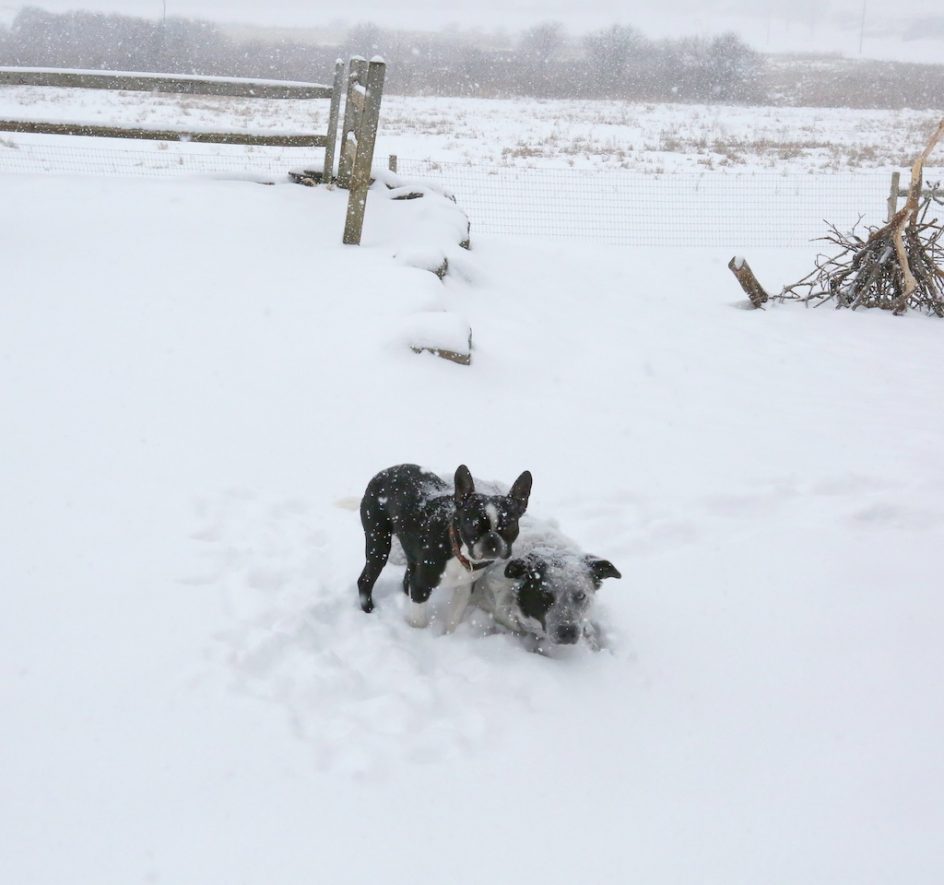
Gus came out with us in the storm, no need for a muzzle today, even Gus couldn’t get through the snow and ice to eat forbidden things. He loves to work with Fate and keep an eye on the sheep.
Some nutrition news related to Gus’s megaesophagus. We are switching his food (gradually) from Pro Plan EN gastroetric food to Canin Royal Turkey and Potato (in a can.) I suggested a food that was a little more filling and also good for digestion and Dr. Fariello chose the turkey and potato.
This is intuition, not science, but I just have the feeling the food is too bland, he is a high energy dog and needs something a bit stronger. That’s my hunch anyway, Dr. Fariello thinks those instincts are good.
We’ll keep adding some of the Royal Canin Recovery hi-calorie food, and I told Dr. Fariello I had been putting some plain vanilla yoghurt into Gus’s food to encourage liquidity, to help lubricate the food so it will go down his esophagus more easily and fluidly.
Gus seems hungry to me, even after eating the EN, so I think he needs something a little more robust. He is not dropping weight the way he was, but not gaining weight either, which we would like.
I am not feeding him small amounts of food five or six times a day, as recommended.
He has tolerated the yoghurt very well over the past few days and regurgitated only once or twice, which is quite natural for megaesophagus dogs. I would prefer for Gus to be healthy, but I welcome the creative challenge of megaesophagus, since no one knows what causes it and there is no cure for it, the treatment is open to experimentation and innovation.
I’ll keep at it until we figure it out in more depth. Gus is looking good, he is active, affectionate, a terror much of the time. He does not in any way appear to be a sick dog. I think we are making headway, one small step at a time.

OK. I hope you take this in the, hopefully helpful, vein in which it is intended. And I know your gut feelings are different than my gut feelings. Regardless, here goes:
Milk products are not “natural” for adult dogs. That’s the way nature made it. This is also consistent with my experience as a lactation consultant which has informed me that, while milk might be palpable to a nursing mother, there can be problems when her milk is passed on to her baby (e.g., colic).
Peg, if you need to write this, feel free.
Of course I checked with our vet an a specialist and they both were enthusiastic about the yoghurt brand and content we fed to Gus, they both thought it was a great idea.
I don’t ever rely on gut instinct, I check everything that I put into his mouth with at least two experienced vets, and also check on veterinary sites online. Since we started putting a teaspoon of yoghurt, Gus has not had a single incident of regurgitation or vomiting, and that is the healthiest possible thing for him and his well-being. And I hope it keeps up. I’m not into warning strangers about things, but I do appreciate your good intensions. I don’t make medical decisions about my dogs from online posts, so that is not really helpful.
Good ideas! Mags has been healthy, happy and regurgitation-free for almost 3 years with a little yogurt, pureed pumpkin and coconut oil in her food along with metoclopramide and famotidine before eating. This disease is tricky and changeable. Gus is a lucky guy to be in such capable hands.